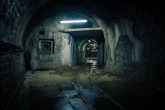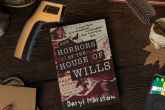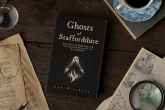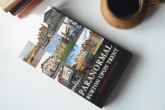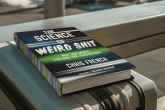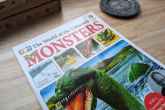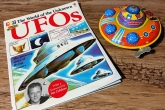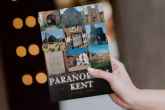Does Real Magic Exist? Dean Radin Shares Ancient Wisdom & Modern Science In His Guide To The Secret Power Of The Universe
June 21, 2022 1:00 AM ‐ Books • Paranormal
This article is more than two years old.
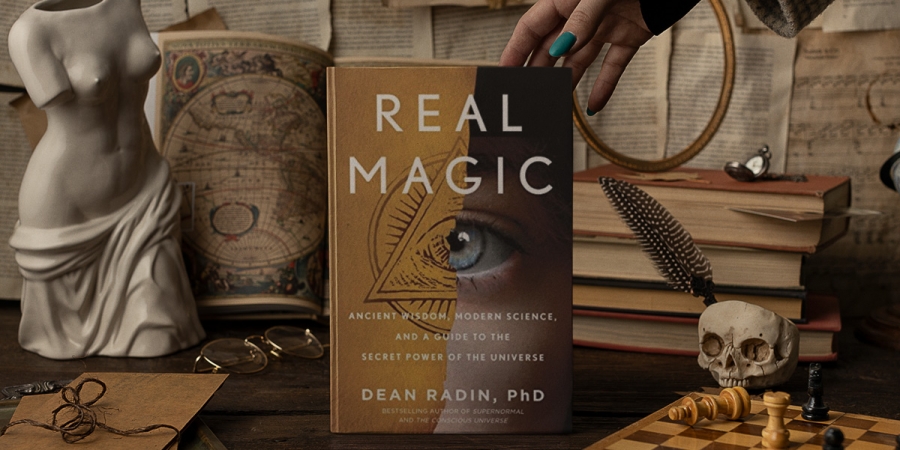
In his 2018 book, 'Real Magic', Dean Radin promises some revelations about real magic, ancient wisdom and modern science that will you unlock your natural psychic abilities to create everyday miracles.
Radin is an author and the chief scientist at the Institute of Noetic Sciences (IONS), a parapsychological research institute that attempts to find scientific meaning in profound human experiences.
It's made clear early on in the book that this isn't about the occult or dark magic. To illustrate this, Radin insists on spelling "magic" correctly, rather than using the more esoteric spelling, magick.
The narrative in the first part of the book follows the history of parapsychology, covering topics like the formation of the prestigious Society for Psychical Research and some of its key members, and the history of psi research. Although interesting, this story is already very well-documented and won't be new to anyone with an interest in the paranormal, however it is a nice, concise reference.
Radin also talks about the birth of spiritualism, mentioning the famous Fox sisters of New York and Russia's Madame Helena Blavatsky, but fails to point out that these controversial characters were fraudulent. The story of the Fox sisters and Blavatsky have their place in the history of parapsychology, but overlooking the true nature of these stories as hoaxes shows, even at this early stage in the book, that there is a lot of bias at play in Radin's writing.
I personally think one part of the book is outright dangerous. Radin speculates about a future where psi abilities are rife and humans can change the world around them. He gives examples such as altering the weather using magic and undoing the threat of climate change. I don't think suggesting that people can wish away climate change is the right message.
The problem with criticising this book is that you instantly make an enemy of yourself. The book isn't written impartially, in fact it's written almost as an attack on the rational and skeptical. Reading between the lines, it feels that the book's aim is to rally up the support of those who already follow Radin's work and encourage them to battle with the naysayers on his behalf.
Having said that, it's hard to be critical of the whole book, there are some very interesting and convincing chapters, including those about the experiments that have been used to test psi abilities, which Radin tells us have had small but significant numbers of positive results.
One particularly interesting part of the book talks about an experiment conducted by Radin and his colleagues which used blessed chocolate and measured its relative effect on happiness compared to unblessed chocolate. The randomly selected volunteers who unknowingly ate the blessed chocolate reported feeling happier, compared to those in the control group who ate the same amount of chocolate that wasn't blessed. A similar experiment showed an increased rate of growth in plants fed with blessed water.
These results are very persuasive and if true, this book is a revelation and its content is sensational, but as the old adage goes if something seems too good to be true, it probably is. The problem is, how can we trust Radin's interpretation or even re-telling of the results when he left out such critical information earlier in the book which would have demonstrated impartiality and balance if included?
The thing being overlooked here is that the number of volunteers participating in the chocolate experiment was very small, only 15 people. This doesn't necessarily mean the results are invalid or that the experiment is flawed. In fact with double-blind protocols in place and a random distribution of blessed and unblessed chocolate amongst the volunteers, it's actually a pretty robust experiment.
So, this makes the results promising, but with just 15 participants, it's not really enough data to provide any valid conclusions. Radin does point out that the positive sway is very small, so to make this experiment more robust, more people would need to be tested.
Later in the book Radin talks about the difficulties he's had getting the findings of his experiments published in scientific journals. Radin claims that this is an example of the mainstream scientific community turning its back on magic, but read with an impartial, open-mind the account can also be considered to be proof that his experiments lacked the required rigour to be taken seriously.
The book tries its best to be scientific, and for the most part it is reasonably scientific, even if lacking the volume of data. But all this work is undone by the constant mentions of works of fiction like 'Harry Potter' and 'Star Wars' which just belittle and trivialise the subject.
There's also an interesting chapter on paranormal investigation, offering a fairly rational take on ghost hunting and the mundanity of sitting in the dark waiting for spooky things to happen. Radin also mentions about voodoo dolls, which according to his experimental data are real and work.
Towards the end of the book there's a very good section on consciousness that explores a question that has so far stumped mainstream science, the debate of what gives rise to consciousness. The chapter also explores such concepts as simulation theory and a shared consciousness.
While the book does attempt to tackle some aspects of modern science, it fails to deliver on its promise of including "ancient wisdom" and "a guide to the secret power of the universe."
As for "unlocking your natural psychic abilities to create everyday miracles," there's no guidance on using secret powers or unlocking psychic abilities. The book hints a lot about force-of-will and intention-based magic, but there's no actual guidance or information on how to practice it.
What he's suggesting though, is nothing more than the methods described in Rhonda Byrne's controversial bestseller, 'The Secret'. So if you actually want to try bringing some magic into your life, there are other self-help books that will better help you focus your intent and look for opportunities to succeed, some of which are wrapped up in mysticism like 'The Secret', but Radin's 'Real Magic' isn't one of those books, despite the claims on its cover.
The book talks a lot about how magic is real and has been measured in experiments, but as for "everyday miracles," there's not a single example or piece of guidance on how you can employ magic in your own day-to-day life.
Overall the book is to-the-point, but fairly dry. The only attempts at humour are at the expense of those who disagree with Radin's beliefs. That's really what this book is, an assault on those with opposing views, which makes it really unclear who the book is actually aimed at.
If you already believe in the concept of real magic, the book might feel a little underwhelming as you're unlikely to want to read 272 pages of text which is seemingly written for the sole purpose of attempting to convert skeptics to believers. On the other hand, if you are a skeptic, you're unlikely to want to read a book on magic in the first place.
It's like someone trying to convince you that German is a real language by bombarding you with historic reports of German being used, all the while failing to teach you any actual German or use a single word of German.
'Real Magic' is available now as an audiobook, as a paperback or on Kindle.
Related Content
Daily Horoscopes
You May Also Like


